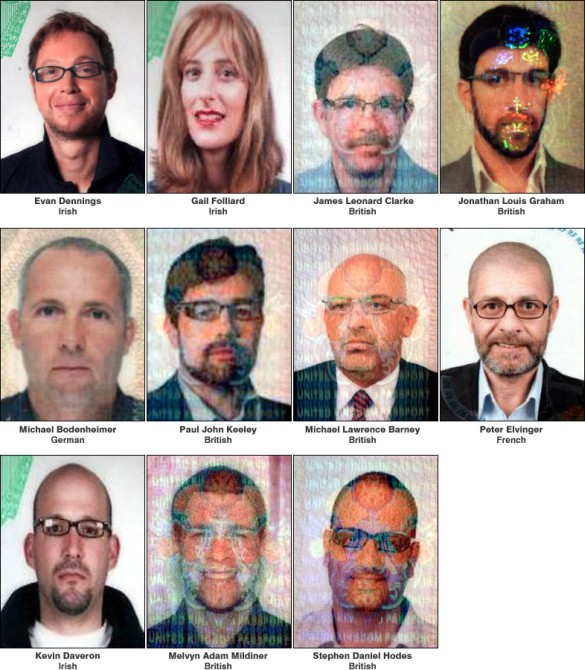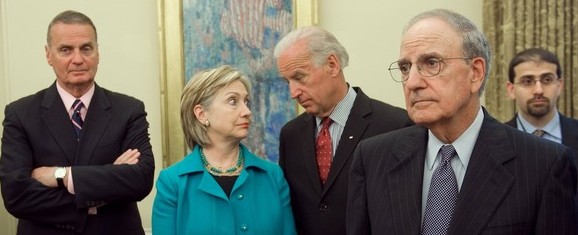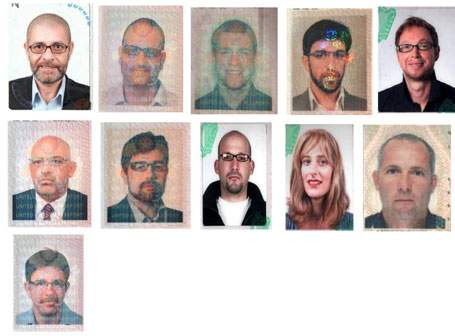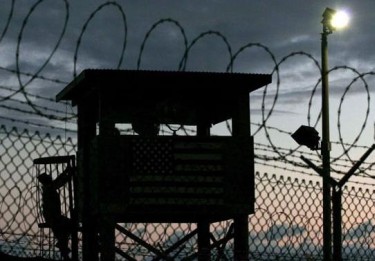Anyone who is Jewish but doesn’t have a Jewish sounding name and who has been considering emigrating to Israel might soon be having second thoughts.
To the extent that Israel provides a safe haven to Jews, it turns out your religious identity might count for less than your name.
The Israeli government has yet to acknowledge that the murder of the Hamas commander, Mahmoud al-Mabhouh, in Dubai last month was carried out by Mossad, but the evidence is now overwhelming.
But the fact that Mossad carried out the killing may turn out to concern Israelis (and Jews elsewhere) less than the apparent willingness of the Israeli intelligence agency to put the lives and liberty of Israeli citizens in jeopardy by stealing their identities.
It now turns out that five Israeli dual nationals claim their identities were stolen in order to provide the Dubai killers with fake passports. (Update – Israel’s Hebrew Ma’ariv now reports that seven Israelis had their identities stolen.)
Haaretz reports:
At least five Israelis awoke Tuesday morning to find their names tied to the assassination of senior Hamas operative Mahmoud al-Mabhouh in his Dubai hotel room last month. All were stunned to find their names displayed on passports that police in the emirate said were used by the assailants.
However, the people pictured in the photos released by police looked nothing like them. All denied involvement in the affair.
“I’m in shock – I just don’t understand how something like this could happen,” said Paul John Keeley, a British-born repairman who lives on Kibbutz Nahsholim, near Zichron Yaakov. Keeley’s name appeared on the British passport Dubai authorities said belonged to one of the hit men.
“From the moment I heard about it I was very worried. I’m worried for my family,” said Keeley, who immigrated to Israel more than a decade ago. “The fact that it was my name that was published in this context makes me worry that someone will try to harm us.”
Keeley, 43 and a father of three, said Tuesday his passport was in his possession before, on and after January 20, the day Mabhouh was assassinated.
“I don’t know who a person calls when his identity is stolen,” he said. “I’m waiting for someone from the British or Israeli government to contact me and give me answers. I don’t understand how something like this could happen.”
Amir Oren adds:
Using the identities of real, living, innocent Israelis for operational documentation is against the law. This kind of abuse also causes innocent civilians to suffer the evil that already plagues ministers and officers: being prevented from traveling abroad for fear of being arrested by Interpol on suspicion of being the Dubai assassins.
Former Mossad chief Efraim Halevy pushed for a Mossad Law to be legislated that would enshrine the state’s obligation to defend its agents caught breaking laws abroad. The initiative never got off the ground: A state can’t legitimize illegality. But neither can it allow one of its institutions to arbitrarily harm civilians — not the police, not the tax authority, not the Shin Bet security service and not the Mossad.
Attorney General Yehuda Weinstein was asked yesterday whether an investigation will be opened following the public complaints of those whose identities were stolen from them, and whose lives and liberty are therefore now threatened. Weinstein has not yet had time to study the issue.
Oren is calling for Mossad chief Meir Dagan to be fired. But why stop there? Who can be so naive as to doubt that this operation was conducted with the authorization and at the behest of the Israeli prime minister himself.
Imagine a parallel in the United States. Richard Nixon couldn’t get away with ordering a burglary – can Netanyahu put his own citizens in jeopardy while ordering a murder?
This may end up not merely undermining public confidence in government officials; it might even shake Jewish confidence in Zionism.


 If the investigation into the murder of the Hamas commander Mahmoud al-Mabhouh in Dubai on January 20, establishes that it was carried out by the Israeli intelligence service, Mossad, Dubai police have said they will issue an arrest warrant for the Israeli Prime Minister Benjamin Netanyahu.
If the investigation into the murder of the Hamas commander Mahmoud al-Mabhouh in Dubai on January 20, establishes that it was carried out by the Israeli intelligence service, Mossad, Dubai police have said they will issue an arrest warrant for the Israeli Prime Minister Benjamin Netanyahu.

 Osama Bin Laden’s favourite son, Omar, recently abandoned his father’s cave in favor of spending his time dancing and drooling in the nightclubs of Damascus. The tang of freedom almost always trumps Islamist fanaticism in the end: three million people abandoned the Puritan hell of Taliban Afghanistan for freer countries, while only a few thousand faith-addled fanatics ever traveled the other way. Osama’s vision can’t even inspire his own kids. But Omar Bin Laden says his father is banking on one thing to shore up his flailing, failing cause — and we are giving it to him.
Osama Bin Laden’s favourite son, Omar, recently abandoned his father’s cave in favor of spending his time dancing and drooling in the nightclubs of Damascus. The tang of freedom almost always trumps Islamist fanaticism in the end: three million people abandoned the Puritan hell of Taliban Afghanistan for freer countries, while only a few thousand faith-addled fanatics ever traveled the other way. Osama’s vision can’t even inspire his own kids. But Omar Bin Laden says his father is banking on one thing to shore up his flailing, failing cause — and we are giving it to him.